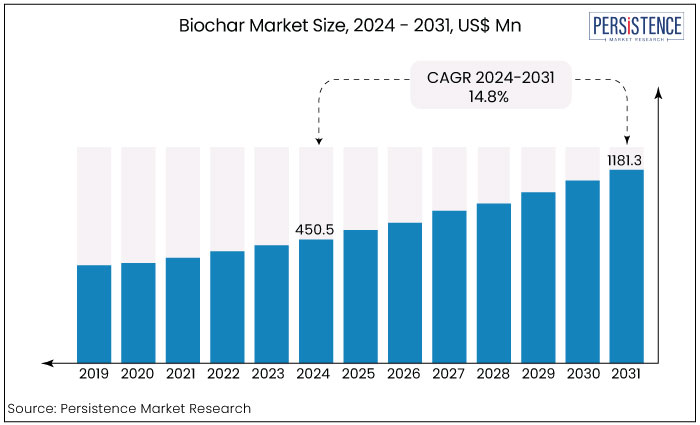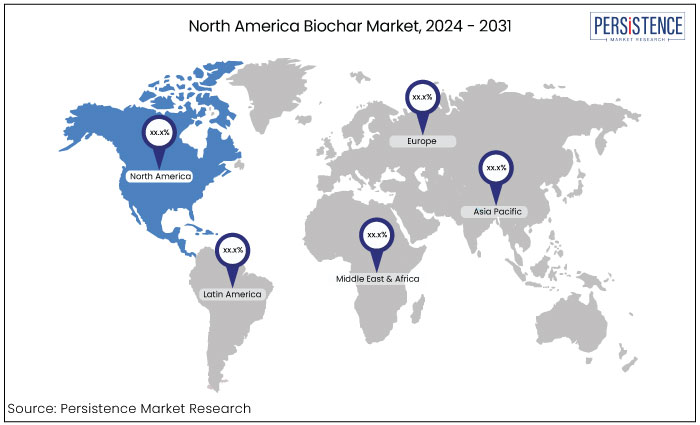Global Market for Biochar is Growing with a Huge Array of Production Technologies, and Business Models Across Regions, and PMR Foresees Increasing Biochar Adoption by Agricultural Sectors
Industry: Chemicals and Materials
Published Date: July-2024
Format: PPT*, PDF, EXCEL
Delivery Timelines: Contact Sales
Number of Pages: 143
Report ID: PMRREP34592
The global biochar market is expected to rise from US$432.7 Mn in 2024 to US$1.1 Bn by the end of 2031. The market is projected to expand at a CAGR of 13.9% during the forecast period between 2024 and 2031.

Key Highlights of the Market
|
Attributes |
Key Insights |
|
Market Size (2024E) |
US$432.7 Mn |
|
Projected Market Value (2031F) |
US$1.1 Bn |
|
Forecast Growth Rate (CAGR 2024 to 2031) |
13.9% |
|
Historical Growth Rate (CAGR 2019 to 2023) |
9.8% |
Ongoing collaboration and research are both important to obtain the full advantages of biochar for a sustainable future. Biochar produces an extensive collection of business models as well as production technologies.
Not all biochars are equivalent and contain various fractions with fundamentally various chemical properties. Hence, experiencing different resistance levels to microbial decomposition.
Increasing requirement for carbon sequestration solutions and rising concerns regarding climate change are the key factors driving the biochar market. Biochar is a stable carbon form, which can sequester carbon in soils for hundreds to thousands of years.
Most of the biochar manufactures use value-added processing for creating biochar-based products, focusing a trend towards post-processing to increase the demand for biochar.
Potential of carbon-negative makes it an effective tool to mitigate greenhouse gas emissions and enhance carbon sinks supporting worldwide efforts to deal with climate change.
Production of biochar relies on raw materials including agricultural byproducts and forest residue, often sourced from leading companies in the forest sector.
The ability of biochar to improve nutrient cycling, soil fertility and water retention has grabbed the complete attention from farmers looking for sustainable practices.
Agriculture is a key factor driving factor fueling the demand for biochar. Farmers now are able to enhance crop yields, enhance soil health and reduce the requirement for chemical fertilizers over the long term by incorporating biochar into soils.
Biochar provides a practical solution, which aligns with objectives of soil resilient and restoration food production systems as sustainable practices attain momentum globally.
The biochar market witnessed steady growth fueled by the factors such as soil health concerns, supportive government policies and growing awareness regarding environmental sustainability.
The market for biochar expanded beyond research and pilot projects into commercial applications during the historical period. The market exhibited a CAGR of 9.8% during from 2019 to 2023.
The market is anticipated to continue growing, especially in agriculture fueled by growing demand for sustainable soil management solutions.
The ability of biochar to improve crop resilience to climate change effects, enhance soil health and reduce the agricultural sector places it preferably in the agricultural sector.
Innovations in the formulations and methods of biochar production can unlock new applications as well as markets especially in industrial and urban settings. Sales of biochar are estimated to record a CAGR of 13.9% during the forecast period from 2024 to 2031.
Growing Awareness, and Concerns over Environmental Sustainability
Biochar is identified for its ability to sequester carbon dioxide from the atmosphere and store it in the soil for hundreds to thousands of years. This process aids in mitigating climate change by reducing greenhouse gas emissions.
As awareness of climate change impacts grows, governments, organizations, and individuals are seeking effective strategies to reduce carbon footprints.
Biochar presents a natural and sustainable method to lock carbon away while improving soil health. Soil degradation is a pressing global issue exacerbated by intensive agricultural practices, deforestation, and erosion.
Biochar enhances soil health by improving nutrient retention, water holding capacity, and microbial activity. It also reduces nutrient leaching, thus promoting sustainable agriculture practices.
As concerns over food security and sustainable land use increase, biochar's role in restoring degraded soils and enhancing crop productivity becomes more appealing.
Prominence of Carbon Sequestration
Offsetting carbon with biochar–up to 12% of the world's human-caused greenhouse gas (GHG) emissions could be sustainably offset by producing biochar from plants, and other organic material, according to a new study published in the journal Nature Communications.
Biochar has the potential to sequester (rather than simply store) carbon into the biosphere. This makes soil an important source of GHG as well as a potential sink if appropriately managed.
Carbon sequestration, the process of storing carbon in soil organic matter and consecutively removing carbon dioxide from the atmosphere has become critical.
The potential of utilising biochar to sequester carbon in the soil is gaining attention to develop climate-smart agricultural practices, thereby providing a string impetus to the global biochar market growth.
Unawareness About Potential Benefits of Biochar
There are many consumers, farmers and land managers yet who are not aware about the potential benefits of biochar. This factor remains a significant factor to restrain the market growth.
A mere 20% of agricultural end users reported employing biochar only to adjust soil pH, mainly due to soil pH adjustment is generally inexpensive to achieve using agricultural lime as compared to biochar.
Educating stakeholders about biochar's applications, benefits, and proper usage is crucial for increasing adoption rates.
The lack of awareness and education can hinder market growth and slow down the acceptance of biochar as a mainstream agricultural input.
Unawareness leads to slow adoption rates of biochar technologies and products. Farmers and agricultural practitioners may be hesitant to adopt biochar due to uncertainty about its efficacy, compatibility with existing practices, and potential benefits.
Slow adoption stifles market growth and delays the realization of biochar's full potential in sustainable agriculture and environmental remediation.
Moreover, the lack of awareness about biochar's benefits can deter innovation and investment in biochar production technologies and applications.
Investors and entrepreneurs may overlook biochar as a promising market opportunity, focusing instead on widely recognized agricultural inputs or environmental solutions.
This limits the development of new biochar products, technologies, and scalable production methods that could drive market expansion.
Expanded Application Beyond Agriculture
There are emerging opportunities in different sectors including water treatment, carbon capture and utilization technologies, environmental remediation and construction materials.
Ability of biochar to improved water quality, enhance insulation properties of building material and absorb pollutants opens doors for a range of applications in industrial as well as urban settings.
Adsorption properties of Biochar make it suitable for water treatment applications. It can effectively remove contaminants such as pesticides, pharmaceuticals, heavy metals, and pathogens from wastewater, drinking water, and industrial effluents.
Biochar filters can be used in decentralized water treatment systems, point-of-use filters, and larger-scale municipal water treatment facilities, providing a natural and cost-effective alternative to conventional treatment methods.
Biochar can improve animal health and waste management in livestock farming. Adding biochar to animal feed or bedding can reduce ammonia emissions, suppress pathogens, and enhance nutrient retention in manure.
Biochar-amended bedding materials can also provide better comfort and hygiene for livestock, contributing to animal welfare standards and sustainable farming practices.
Pyrolysis Technology to Dominate the Market
Pyrolysis technology helps to control over different operating conditions such as heating rate, temperature and residence time, resulting in biochar with properties.
These properties include porosity, stability and high surface area which enhance effectiveness of biochar in carbon sequestration, environmental remediation applications and soil amendment.
This technology is estimated to lead the market with its growing adoption. A few other factors that increase the demand for this technology are convenient, inexpensive and can handle different feedstocks.
Avoiding greenhouse gas emissions is also easy with the use of this technology. This is one of the key factors to fuel the demand for pyrolysis technology over the anticipation period.
Power Generation to Record a CAGR of 15.3%
Power generation facilities, particularly biomass power plants, can utilize biomass feedstocks including forestry residues, agricultural residues, and energy crops to produce electricity and heat.
These facilities often employ pyrolysis or gasification technologies to convert biomass into biochar, bio-oil, and syngas.
Biochar produced in this process is a byproduct that can be further utilized as a soil amendment or for other applications.
Existing biomass power generation infrastructure provides a scalable platform for biochar production.
Biomass power plants are typically equipped with biomass handling systems, pyrolysis or gasification reactors, and energy conversion technologies that can be adapted or enhanced to include biochar production capabilities.
This infrastructure supports efficient and cost-effective biochar production at various scales, from small-scale co-generation facilities to large industrial plants.
North America to be a Frontrunner in the Global Biochar Market
North America exhibits the largest biochar production followed by two key regions including Europe, and Asia Pacific. The production of biochar is expanding significantly in North America.
Canada, and the US are the leading countries in North America region. The region hugely benefits from supportive policies and robust agricultural sectors promoting strong focus on environmental sustainability as well as sustainable farming practices.
Biochar production facilities and applications in environmental remediation, agriculture and forestry are comparatively well-established in North America.

The competitive scenario in the biochar market is characterized by innovation in production technologies, diverse application opportunities, global and regional market dynamics, customer awareness, and strategic collaborations.
Market players differentiate themselves by offering high-quality biochar products, innovative solutions, and sustainable practices aligned with environmental stewardship and economic viability.
Collaboration among biochar producers, technology developers, research institutions, and end-user fosters innovation and market competitiveness.
Strategic partnerships enable knowledge sharing, joint research and development efforts, and expanded market reach. Collaborative projects also facilitate scaling up biochar production, enhancing competitiveness through economies of scale and shared resources.
June 2024
CharGrow USA introduced an innovative biochar blend that includes added mycorrhizal fungi, designed to improve plant health and growth in various soil conditions, targeting both commercial agriculture and home gardening markets.
April 2024
Black Owl Biochar announced the establishment of new production facilities in Southeast Asia, aiming to cater to the growing demand for biochar in the region's agriculture and forestry sectors.
November 2023
ArSta Eco, an emerging player in the biochar market, launched a new biochar product line specifically designed for use in water filtration and pollution control, leveraging its unique adsorption properties.
July 2023
Bioforcetech Corporation, a leader in waste-to-energy technology, acquired a smaller biochar startup to integrate its advanced pyrolysis technology and expand its biochar product line for waste management and agricultural use.
March 2023
Pacific Biochar formed a joint venture with a major agricultural company to develop large-scale biochar production facilities in California, aiming to supply biochar to local farms and vineyards to improve soil health and sequester carbon.
September 2022
Carbon Gold, a UK-based company, introduced a new range of enriched biochar products aimed at the horticulture and agriculture sectors, focusing on enhanced soil health and increased crop yields.
May 2022
Biochar Now, a leading biochar manufacturer in the US, announced the expansion of its production facilities to meet growing demand for biochar in agriculture and environmental applications.
|
Attributes |
Details |
|
Forecast Period |
2024 to 2031 |
|
Historical Data Available for |
2019 to 2023 |
|
Market Analysis |
US$ Million for Value |
|
Key Regions Covered |
|
|
Key Countries Covered |
|
|
Key Market Segments Covered |
|
|
Key Companies Profiled |
|
|
Report Coverage |
|
|
Customization & Pricing |
Available upon request |
By Technology
By Application
By Region
To know more about delivery timeline for this report Contact Sales

The market is estimated to increase from US$ 432.7 Mn in 2024 to US$1,076.1 Mn by the end of 2031.
Growing awareness and concerns over environmental sustainability is a key factor driving the market growth.
Pyrolysis technology is projected to dominate the market with a CAGR of 15.1%.
Expanded applications in other sectors beyond agriculture is a key opportunity for the market players.
A few of the leading manufacturers in the market are BC Biocarbon LTD, Bella Biochar Corporatio, and BioChar Now.